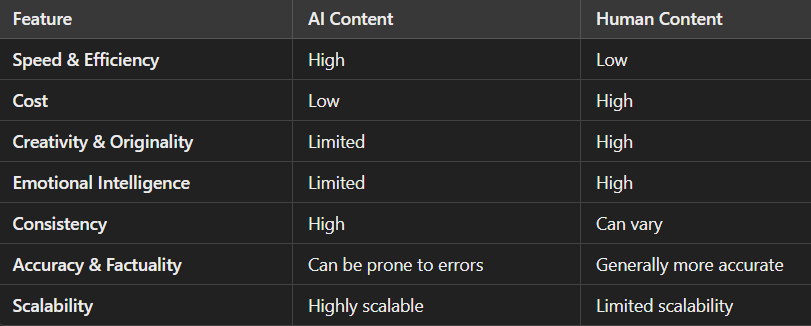
In today’s rapidly evolving digital landscape, content marketing has become a cornerstone for businesses of all sizes. However, AI Content vs. Humanized Content , the rise of Artificial Intelligence (AI) has introduced a new player in the content creation game: AI-generated content. This raises a crucial question: which approach is superior – AI-powered content or content crafted by human hands?
What is AI Content?
AI content is generated using artificial intelligence algorithms and machine learning models. These tools can analyze vast amounts of data, identify patterns, and generate text that mimics human writing styles. This includes articles, blog posts, social media updates, product descriptions, and even creative content like poems and short stories.
What is Human Content?
Human content is created by skilled writers who possess creativity, critical thinking, and emotional intelligence. It involves in-depth research, nuanced understanding, and the ability to craft compelling narratives that resonate with the target audience. Human writers can infuse their unique perspectives, experiences, and emotions into their work, creating content that is authentic, engaging, and emotionally resonant.
Which One Is Better?
The “better” option depends heavily on the specific context and goals.
AI Content:
- Strengths:
- Speed and Efficiency: AI can generate content quickly and efficiently, making it ideal for tasks like drafting initial drafts, generating ideas, and creating variations of existing content.
- Cost-Effectiveness: AI tools can significantly reduce content creation costs by automating repetitive tasks.
- Consistency: AI can maintain consistent tone and style across different pieces of content.
- Data-Driven Insights: AI can analyze data and identify trends to create content that resonates with the target audience.
- Weaknesses:
- Lack of Originality and Creativity: AI-generated content can often lack the originality, creativity, and nuanced understanding that human writers possess.
- Potential for Bias: AI models are trained on existing data, which may contain biases that can be reflected in the generated content.
- Lack of Emotional Intelligence: AI struggles to understand and convey emotions, making it difficult to connect with audiences on an emotional level.
- Ethical Concerns: Concerns around plagiarism, copyright infringement, and the potential for AI-generated content to spread misinformation.
Human Content:
- Strengths:
- Creativity and Originality: Human writers possess the unique ability to think creatively, develop original ideas, and craft compelling narratives.
- Emotional Intelligence: Human writers can effectively convey emotions, build empathy, and connect with audiences on a deeper level.
- Critical Thinking and Analysis: Humans can critically analyze information, identify biases, and produce high-quality, insightful content.
- Authenticity and Personal Touch: Human-written content often carries a unique voice and personality, making it more authentic and engaging.
- Weaknesses:
- Higher Costs: Hiring human writers can be more expensive than using AI tools.
- Time-Consuming: Human content creation can be more time-consuming compared to AI-generated content.
- Inconsistent Quality: The quality of human-written content can vary depending on the writer’s skills and experience.
A Hybrid Approach
The most effective approach often lies in a hybrid model, combining the strengths of both AI and human intelligence. AI tools can be used to assist human writers by:
- Generating initial drafts and ideas.
- Conducting research and gathering information.
- Identifying potential topics and keywords.
- Identifying and correcting grammatical errors.
Human writers can then review, refine, and enhance the AI-generated content, adding their unique creativity, emotional intelligence, and critical thinking skills.
RaGa Solutions, can guide you in choosing the correct technique, We are situated in Panchkula.
Table: AI Content vs. Human Content

FAQs about AI Content vs. Human Content:
-
- Can AI completely replace human writers?
- No, while AI tools can assist with various aspects of content creation, they cannot fully replace the creativity, critical thinking, and emotional intelligence of human writers.
- Can AI completely replace human writers?
-
- What are the ethical concerns surrounding AI-generated content?
- Concerns include potential for plagiarism, copyright infringement, the spread of misinformation, and the impact on human jobs.
- What are the ethical concerns surrounding AI-generated content?
-
- How can I detect AI-generated content?
- Several tools are available to detect AI-generated text, although their accuracy can vary. Human review is still the most reliable method for assessing the quality and authenticity of content.
- How can I detect AI-generated content?
-
- What are the best use cases for AI content generation?
- AI excels at tasks such as generating initial drafts, translating languages, summarizing text, and creating variations of existing content.
- What are the best use cases for AI content generation?
-
- How can I effectively combine AI and human content creation?
- Use AI tools to assist human writers by generating initial drafts, conducting research, and identifying potential topics.
- Human writers can then review, refine, and enhance the AI-generated content with their unique creativity and expertise.
- How can I effectively combine AI and human content creation?
-
- What is the future of AI in content creation?
- AI technology is constantly evolving, and we can expect to see continued advancements in its capabilities.
- The future likely involves a synergistic relationship between AI and human writers, with each leveraging their respective strengths to create high-quality, engaging content.
- What is the future of AI in content creation?
Final Verdict
The choice between AI Content vs. Humanized Content depends on various factors, including budget, time constraints, the nature of the content, and the desired outcome.
While AI tools can be valuable assets in content creation, they should not be seen as a replacement for human ingenuity and creativity. The most effective approach often lies in a synergistic combination of AI and human intelligence, leveraging the strengths of both to produce high-quality, engaging, and effective content.
This comprehensive analysis provides a deeper understanding of the strengths and weaknesses of AI Content vs. Humanized Content , empowering you to make informed decisions about your content creation strategy.